“In a room in a tower, high above the city, a piano was playing a man.” This was more or less the first sentence I ever read in a science fiction story, and the oddness of it made a deep impression. I was 13—the story was in a book someone had given me for Christmas. It was called Adventure Stories for Boys, or something similar. I can no longer remember the real title of the book, and all the stories were unsigned, but that opening sentence has stayed with me.
Music runs through our lives, a private delight often shared with others. We all hum, whistle, sing to ourselves. Many of us play instruments, many more sing for pleasure. However, the composer of music stands alone. Where does music come from? What is the nature of the creative urge or talent that responds to imagined chords and harmonies, then channels them to produce an arrangement of notes that no one has ever heard before?
To me, tone deaf and unable to hold a note, it’s a mystery which has become the basis of my most recent novel, The Gradual, out in September 2016 from Titan Publishing. In my story a young composer finds musical inspiration in the islands he can glimpse in the distance from his coastal home. They are part of the Dream Archipelago, a forbidden zone—officially they do not even exist. Yet he senses a profound and inexplicable attraction which he channels into his compositions. As soon as he can he escapes to the islands, where he discovers that in music, as in life, time is as important as sound. Time runs in a gradual fashion, imperceptibly shaping our lives.
Here are five science fiction books—four novels and a themed story collection—where music and time conjoin:
Vermilion Sands by J. G. Ballard (1971)
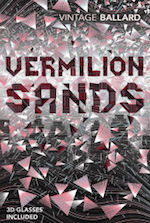 All nine of these beautiful and enigmatic stories are about art in general, and sometimes music in particular. Notable amongst them is “Prima Belladonna”—amazingly this was one of Ballard’s first published stories in 1956. In a decadent future resort, the owner of a tourist shop which sells genetically modified singing flowers, meets a young and mysteriously alien singer whose voice enchants all those who hear it, but which psychically destroys the flowers. This is a key Ballard book, containing much of his best early work. Not included in Vermilion Sands, but just as highly recommended, is another of his stories about music. “The Sound-Sweep” is amongst his finest works, one of the greatest SF stories of the period.
All nine of these beautiful and enigmatic stories are about art in general, and sometimes music in particular. Notable amongst them is “Prima Belladonna”—amazingly this was one of Ballard’s first published stories in 1956. In a decadent future resort, the owner of a tourist shop which sells genetically modified singing flowers, meets a young and mysteriously alien singer whose voice enchants all those who hear it, but which psychically destroys the flowers. This is a key Ballard book, containing much of his best early work. Not included in Vermilion Sands, but just as highly recommended, is another of his stories about music. “The Sound-Sweep” is amongst his finest works, one of the greatest SF stories of the period.
The Alteration by Kingsley Amis (1976)
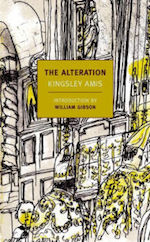 I will describe this as a counterfactual, in deference to Amis’s general dislike of the phrase “alternate history”, although he did make something of an exception for its use in the SF world. The Alteration is one of the very few SF novels written by an established literary author which shows deep knowledge of, and liking for, science fiction. Indeed, there are in-joke references to SF writers, notably Harry Harrison and Keith Roberts, who both wrote counterfactual novels. We are in a modern world where the Reformation has not taken place, and the Roman Catholic church is dominant. A boy soprano, widely admired for the purity of his voice, is approaching puberty. An “alteration” to prevent this is necessary. Surgery is planned, but the boy, realizing what it will involve, takes to his heels.
I will describe this as a counterfactual, in deference to Amis’s general dislike of the phrase “alternate history”, although he did make something of an exception for its use in the SF world. The Alteration is one of the very few SF novels written by an established literary author which shows deep knowledge of, and liking for, science fiction. Indeed, there are in-joke references to SF writers, notably Harry Harrison and Keith Roberts, who both wrote counterfactual novels. We are in a modern world where the Reformation has not taken place, and the Roman Catholic church is dominant. A boy soprano, widely admired for the purity of his voice, is approaching puberty. An “alteration” to prevent this is necessary. Surgery is planned, but the boy, realizing what it will involve, takes to his heels.
A Clockwork Orange by Anthony Burgess (1962)
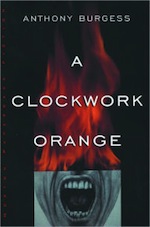 Another entry in the SF genre by a writer recognized as a literary author. Unlike Amis, who wrote in full awareness of the genre, Anthony Burgess appears to have conceived his dystopian future from general principles. He was deeply involved with music all his life, and was a prolific composer. Much of his music was performed in his lifetime. A Clockwork Orange is written in a sort of slang-ridden argot of English and Russian, describing the actions of a young gang (“droogs”), roaming the streets to commit rape, burglary and murder. Alex, the teenage leader of the gang, is obsessed with the symphonies of Beethoven. Arrested and jailed, he is tamed by sessions of brutal psychological conditioning. During this treatment he forms a violent aversion to Beethoven, putting his rehabilitation into question. The film of the novel directed by Stanley Kubrick (1971) follows the American first edition, which cut out the final chapter published elsewhere. This shows Alex as an unreformed character, whereas Burgess’s intention, in the original, was to suggest a cure was possible.
Another entry in the SF genre by a writer recognized as a literary author. Unlike Amis, who wrote in full awareness of the genre, Anthony Burgess appears to have conceived his dystopian future from general principles. He was deeply involved with music all his life, and was a prolific composer. Much of his music was performed in his lifetime. A Clockwork Orange is written in a sort of slang-ridden argot of English and Russian, describing the actions of a young gang (“droogs”), roaming the streets to commit rape, burglary and murder. Alex, the teenage leader of the gang, is obsessed with the symphonies of Beethoven. Arrested and jailed, he is tamed by sessions of brutal psychological conditioning. During this treatment he forms a violent aversion to Beethoven, putting his rehabilitation into question. The film of the novel directed by Stanley Kubrick (1971) follows the American first edition, which cut out the final chapter published elsewhere. This shows Alex as an unreformed character, whereas Burgess’s intention, in the original, was to suggest a cure was possible.
Cloud Atlas by David Mitchell (2004)
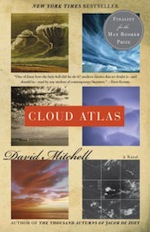 The novel has a complex structure, consisting of six partially connected stories set in different historical periods. One of the longest stories, close to the centre, describes a distant future world which is based on a slave society of “fabricants”, humans who are drugged into submission. The remarkable quality of this novel is that it was essentially inspired by, and based on, music—in particular, two pieces written by husbands of the artist Yoko Ono: Toshi Ichiyanagi and John Lennon. One of the strongest and most entertaining sequences in the novel is loosely based on the story of Eric Fenby, a young musician who went to work as amanuensis to the dying composer Frederick Delius. A challenging but rewarding novel, highly ambitious and achieved, full of layers and suggestions and haunting images.
The novel has a complex structure, consisting of six partially connected stories set in different historical periods. One of the longest stories, close to the centre, describes a distant future world which is based on a slave society of “fabricants”, humans who are drugged into submission. The remarkable quality of this novel is that it was essentially inspired by, and based on, music—in particular, two pieces written by husbands of the artist Yoko Ono: Toshi Ichiyanagi and John Lennon. One of the strongest and most entertaining sequences in the novel is loosely based on the story of Eric Fenby, a young musician who went to work as amanuensis to the dying composer Frederick Delius. A challenging but rewarding novel, highly ambitious and achieved, full of layers and suggestions and haunting images.
Station Eleven by Emily St. John Mandel (2014)
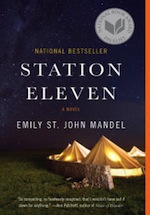 In some respects Station Eleven is a modern return to a classic SF form: a novel describing a worldwide disaster which leaves only a handful of survivors. In one detailed section of the novel we follow a small group of characters before and after the catastrophe, some survive and others do not. One of them ends up in a raggle-taggle band of wanderers, struggling for existence in Michigan, following the shorelines of the Great Lakes. They call themselves the Symphony. By day they are forced to barter, argue and sometimes fight to stay alive, driving through the woods in their old pickup trucks, now engineless and horse-drawn. In the evenings they set up camp, take out musical instruments and perform Beethoven and Sibelius for the (small) audiences who emerge from their own hiding places. But this is only one aspect of an extremely satisfying, highly original and often moving novel.
In some respects Station Eleven is a modern return to a classic SF form: a novel describing a worldwide disaster which leaves only a handful of survivors. In one detailed section of the novel we follow a small group of characters before and after the catastrophe, some survive and others do not. One of them ends up in a raggle-taggle band of wanderers, struggling for existence in Michigan, following the shorelines of the Great Lakes. They call themselves the Symphony. By day they are forced to barter, argue and sometimes fight to stay alive, driving through the woods in their old pickup trucks, now engineless and horse-drawn. In the evenings they set up camp, take out musical instruments and perform Beethoven and Sibelius for the (small) audiences who emerge from their own hiding places. But this is only one aspect of an extremely satisfying, highly original and often moving novel.
Top image: A Clockwork Orange (1971)
 Christopher Priest is a contemporary novelist and a leading figure in modern SF and fantasy. His novel The Islanders won both the BSFA Award and the John W. Campbell Award. The Separation won both the Arthur C. Clarke Award and the BSFA Award. He was selected for the original Best Of Young British Novelists in 1983.
Christopher Priest is a contemporary novelist and a leading figure in modern SF and fantasy. His novel The Islanders won both the BSFA Award and the John W. Campbell Award. The Separation won both the Arthur C. Clarke Award and the BSFA Award. He was selected for the original Best Of Young British Novelists in 1983.










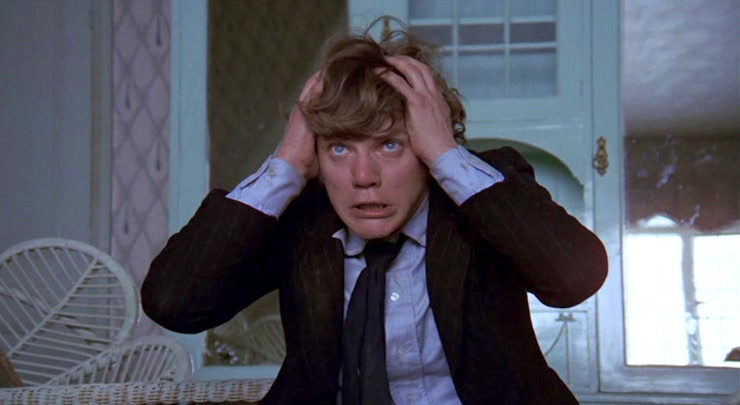
Don’t forget a wonderful book
The Chimes
Anna Smaill
You cannot talk about SF/Fantasy book that have music as a central component and not mention The Name of the Wind!!!! For shame!
The first series that sprang to mind when I saw this article is Sharon Shinn’s Samaria series, in which the ruling population speaks with “God” via music. Music and song are central to the plots, and the prose itself is lyrical and musical in its descriptions. The books she paid homage to in the series, the Pern novels, also have a muscial YA set with the Dragonsinger books.
A newer book would be The Hum and the Shiver by Alex Bledsoe, which has magic mixed with Appalachian folk songs.
How about Alan Dean Foster’s Spellsinger series?
In the fantasy genre, Terry Pratchett’s Soul Music introduces the inhabitants of the Discworld to the pleasures of Music with Rocks In:
“This was music that had not only escaped, but had robbed a bank on the way out. It was music with its sleeves rolled up and its top button undone, raising its hat and grinning and stealing the silver.”
Jack Vance also liked to incorporate music: perhaps the most extensive (and funniest) example comes in Space Opera, where Roger Wool accompanies his rather Wodehouseian aunt on a tour designed to introduce classic opera to a number of alien worlds; this goes about as well as you would expect.
The Memory of Whiteness by Kim Stanley Robinson. The novel is built around an interplanetary concert tour.
Infinity Concerto by Greg Bear
Mentioning The Alteration reminds me that Thomas Disch’ On Wings of Song is also about a singer who eventually faces that same operation. It’s also, as one might expect from Disch, a savage examination of American society.
In Mary Doria Russell’s The Sparrow, SETI finds its first alien civilization when an anomalous signal proves to be a music broadcast.
This is the one that came to mind for me, from Orson Scott Card. It’s called Songmaster, about a boy with an extraordinary gift with song which amplifies emotions in others and is used for political gain (big surprise).
Bester’s “The Demolished Man”!
“Tension, apprehension, and dissension have begun!”
I would rate much higher than “Station Eleven”, John Shirley’s “A Song Called Youth” – formerly, the “Eclipse” trilogy – which features a rock and roll guitarist, Rickenharp, who becomes a key figure in the resistance movement depicted in Shirley’s epic work, which may be the best trilogy written by one of the founding figures of cyberpunk not named William Gibson. Speaking of Gibson, music is also featured in his work, most notably, his novel “Idoru”.
A recommendation for ‘The Crystal Singer’ trilogy by Anne McCaffrey. = Cutting crystals by using your singing voice plus a special gun. Amazing!
Manley Wade Wellman’s “Silver John” stories, following a wandering Appalachian folksinger (and supernatural-issues troubleshooter).
Lovecraft’s “The Music of Erich Zahn”, the titular violinist frantically playing his human music to hold back the unfriendly unknown.
Twilight Zone episode “Come Wander With Me”, in which an ambitious singer is trapped by the folk song he tried to buy.
And a short story I really wish I could remember the writer and title of, about a concert-goer who briefly experiences life in a dimension where notes and melodies are living organisms. It was decades ago, alas, and I haven’t a clue who wrote it now.
more fantasy then scifi maybe: Tanya Huff’s The Wild Ways and Future Falls
@3 – I love those (the Samaria) books :)
My first thought was, naturally, the Silmarillion, in which the world is literally created through music.
I’ve been thinking a lot about music lately too, because I was journalling a bit about my favorite soundtrack scores from John Williams (and then also commenting on a similar themed post here) and it made me think a lot about what it is that can move me (and others) so strongly, even to the point of tears. There is some scientific research out there about what, exactly, music is doing to us neurologically. One hand, I hate to reduce it to something like that (it makes it seem a bit reductionist or deterministic or like we’re just slaves to it) but on the other hand, it’s fascinating and seems almost universal. Maybe not the styles of music, but just the fact that music is important. So, of course that will be reflected in the human brain.
I submit “Glimpses” by Lewis Shiner for another music-themed and brilliant novel by an often overlooked writer.
@10. Good call but you can’t mention Card without mentioning his short story Unaccompanied Sonata. One of my all time favorite short stories.
And how about some love for Vitally Chernobyl and the Meltdowns?
SchuylerH @5 mentions Jack Vance and his novel “Space Opera”. An excellent suggestion in this context. I would also suggest Vance’s Durdane trilogy. A major plot element is the hero’s struggle to escape from the bizarre cult he is born into and to become a musician. Vance was brilliant in inventing fantastical musical instruments and the strange music to be played on them.
For one that ends on a rather shaggy-dog note, albeit musically, we have Arthur C. Clarke’s Childhood’s End; the sole surviving human on a world of post-humans, is quite naturally, the world’s best pianist. Nobody else can match him … :)
There’s music all through Ann Leckie’s “Ancillary” books. The AI Justice of Toren, in its sub-segment known as One Esk, is very fond of singing multiple-part choral music with itself. And its sole surviving unit Breq goes on collecting songs wherever it/she is, and always has the right lyric for the right occasion.
If we’re including fantasy, there’s L.E. Modesitt’s “Spellsong” books, set in a world where music literally is magic. All music, which I always thought was rather sad, because a world where music is magic is a world without music as music. Nobody can sing a simple love song or drinking song or lullaby without invoking unwanted magical side-effects, and and playing an unauthorized instrumental is a capital crime.
It’s more urban fantasy than Science Fiction, but Emma Bull’s “The War for the Oaks” has music from beginning to end – its focus is on a bandleader, after all.
Kathleen Ann Goonan’s trilogy (Mississippi Blues, Queen City Jazz, and Light Music) which combines a nanotech run amok apocoalypse with music simply must be on this list.
I fully expected the following book to be one of the five: The Lathe of Heaven by Ursula K LeGuin published in 1971. George Orr’s story is visualized “With a Little Help From My Friends” . The book is amazing as is PBS’s adaptation of it made in 1980. Both are hard to find nowadays.
Another one on the fringes of SF, Time Traveler’s Wife, though it wasn’t about music, was infused with music. I was sorry that the music in the story was left out of the movie entirely; it seemed like it would have been a natural aspect of the book to carry over to enhance the movie.
I’ll second (or third) McCaffrey’s Crystal Singer & Pern books. Music was a huge part of her life that flowed into many areas of her writing.
Just yesterday I was thinking about “The Alteration” and all the fuss over it when it was released. A longish review in Time Magazine, IIRC, and more.
That said, why is any alternate history story automatically classified as science-fiction? (Fantasy, sure. But S-F? That does not compute.) Never having read The Alteration, is there some science-fiction element? As I recall the write ups implied that the revised Catholic church continued to stifle science so that the 20th century seemed more like the turn of the 18th in terms of technology. On the other hand, Harry Harrison’s “A Transatlantic Tunnel, Hurrah!” did have S-F elements.
short story: Unaccompanied Sonata by Orson Scott Card (had me crying at the end)
novels:
Songmaster also by Orson Scott Card (beautifully written)
Carolan’s Concerto by Caiseal Mór (why can’t books have sound??)
How could you forget Armageddon Rag by George R. R. Martin, and Cowboy Feng’s Space Bar & Grill by Steven Brust?!
My contribution to this off-list might be particularly interesting to Lisamarie: Paul Cook’s Tintagel is heavily focused on the psychological/neurological effects of certain pieces of music on the human mind, and each chapter has its own piece of classical music as a theme, with composers like Villalobos or Satie
I’m glad someone mentioned the Silver John stories (a travesty of a movie was made from them, btw). And I’m impressed by the groups mentioned–and played as an accompaniment to her adventures–in Gini Koch’s Alien series.
If you include fantasy and not just science fiction, music and magic go together like wine and cheese.
Patrick Rothfuss’s Name of the Wind/ The Wise Man’s Fear–the entire point of the book is what happens to a musical person who loses his music.
Peter S. Beagle’s The Unicorn Sonata.
Alex Bledsoe’s The Hum and the Shiver.
Patricia McKillip’s the Riddle-Master of Hed.
The Harper Hall trilogy by Anne McCaffrey, part of her Dragonriders of Pern series.
The Wishsong of Shannara, by Terry Brooks.
Tigana, by Guy Gabriel Kay. Many of the central characters are musicians from all over the land. Music is a common bond, a window into their souls, a tool they use for their revolution, a way to recognize other displaced Tiganese, and probably other, more subtle authorial purposes that I’m unaware of.
After Long Silence, by Sheri Tepper. Singers must sing the proper notes before travelers can safely pass mysterious crystal sentinals.. I don’t recall the book being quite as steeped in music as TIgana and some other suggestions above are, but I think it bears mentioning.
A couple more short stories:
“Flying Saucer Rock and Roll” by Howard Waldrop, about the last great doo-wop contest and the real cause of the 1965 Northeast Blackout.
“Words and Music” by William Sanders, a classic duel with the Devil in the context of a Cherokee gospel-music festival.
And don’t miss The Memory of Whiteness by Kim Stanley Robinson that has as central the incredible musical instrument the Holywelkin Orchestra and much to say about music and it’s effect on people.
Bother, missed #6 (I did think I’d checked!) who has beaten me to it. The book is kind of a forrunner of his later 2312 which also has a tour of the solar system.
If we’re including urban fantasy, I loved Tom Deitz’s SoulSmith trilogy. Songs on the radio served as a kind of magical tarot deck for members of the main character’s clan, revealing glimpses of upcoming events.
On the fantasy side, there are the Bardic Voices books by Mercedes Lackey.
Astronomer Fred Hoyle mostly wrote novels in which ~contemporary scientists encounter intelligences so advanced that communication with them is barely possible even after they’re recognized as intelligent — but he also wrote October the First is Too Late, which is narrated by a composer/conductor whose work is entangled with the inexplicable intersection of Earths of various times in one space. His collaborator (son Geoffrey) may be responsible for the more heartfelt tone of this novel compared to Fred’s solo works, but in any case the result is very effective.
If this thread is still open–
Does anyone remember a novel called “A Mirror for Observers” by Edgar Pangborn, dating from the mid-fifties, I think? I read it many years ago and have never forgotten it. I’m still a bit weird about Beethoven’s “Waldstein” Sonata, which plays a significant role. I’m not too eager to re-read it now though; it might not have aged well.
Also, a short story that I first read 50 or so years ago and that has haunted me ever since: “Old Hundredth” by Brian Aldiss.
Anyone know the author or title of this tale?
Many years ago I read a story about a musician who played an instrument (clarinet?) in an orchestra — but a world so noisy that everyone’s hearing had atrophied. Audiences attend concerts at which they watch machines that register pitches as the music played. The protagonist barricades himself in a padded room until his sense of hearing returns. However, when he emerges, the blast of sound drives him back into the sound-proofed room.
He then invents a machine that will display pitches but requires no musicians. The hero thinks this will convince people to reduce the world’s noise so that they can hear again. The plan fails, however.
The Moon Moth, Jack Vance’s wonderfully inventive and funny short story. ON this planet, everyone must sing and play difficult instruments in order to communicate.
Did anybody mention ‘the Ship Who Sang’? I didn’t see it.